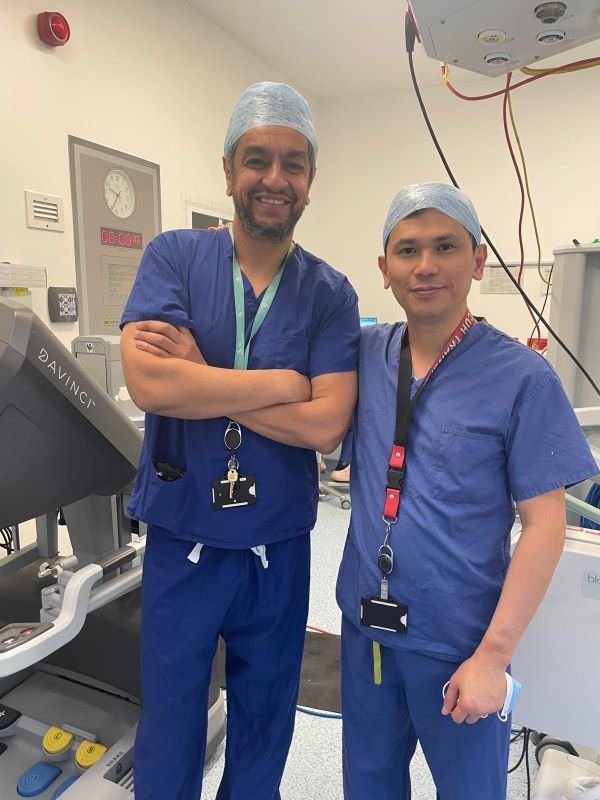A cancer patient who underwent the first robot-assisted double operation at Addenbrooke’s Hospital said today: “I was blown away by how fast it was all over.”

Philip Greene, from Ipswich, said he could not believe how smoothly his surgery had gone, how little pain he was in afterwards, and that he was allowed home just three days later.

The 69-year-old former field service engineer was the first Addenbrooke’s patient to have a robot-assisted joint bowel and liver operation following colon cancer which spread to his liver.
He said:
One minute the anaesthetist was explaining I’d soon drift off, and the next I was waking up in recovery and looking at a chap in the bed opposite.
It was like a win-win. The surgeons now know they can do the procedure, and I am out of hospital and doing well. I can see how this will benefit other people in the future, and how it could be applied to other kinds of surgeries.
Mr Philip Greene
Philip agreed to the operation, which involved keyhole-type surgery rather than open surgery. He had endured three months of gruelling chemotherapy treatment at his local hospital, aimed at shrinking the tumour, which had been diagnosed after a routine stool test exposed suspicious results.
When he was chosen for the pioneering surgery at Addenbrooke’s using a Da Vinci robot, Philip said he hadn’t felt apprehensive, or lucky, but pleased he could help clinicians progress new techniques.
By contrast, his partner Jan Cobb was “petrified”, so it was a relief when he came around from his operation on 2 April, which left him with seven small puncture wounds, rather than two large scars.
The complex dual operation was carried out by a team of colorectal and hepatobiliary surgeons led by Chair of the Trust’s Robotic Surgery Steering Group (RUG) and hepatobiliary surgeon, Mr Siong-Seng Liau, and consultant colorectal and robotic surgeon, Mr Michael Powar.

Mr Siong-Seng Liau said:
Surgery of this sort would normally be completed in two procedures on two separate days, and involve two periods in hospital totalling up to seven to ten days.
This is the first time we have done this kind of double robotic surgery procedure, which is extremely rare elsewhere in the country, and we are delighted it was such a success. We are exploring how this technique could be applied to other surgeries
Mr Siong-Seng Liau
Mr Powar highlighted the collaborative effort. He said:
This success reflects the seamless teamwork across our specialities, anaesthetic and theatre teams. This is a significant advancement in personalised cancer care for our patients by minimising trauma, reducing complications and enhancing recovery
Mr Michael Powar
Now Philip is looking forward to and catching up with a 65-day backlog on his music subscription service, and his photography hobby, capturing nature and interesting architecture.
He said:
Purely going by my experience I would say that if you need surgical interventions then this kind the doubling up technique is good because it saves two separate operations, and means less time in hospital.
The team at Addenbrooke’s were absolutely marvellous and made me feel very relaxed in theatre. One asked if I was allergic to anything and I replied: ‘robotic surgery’. It was a funny moment!
Mr Philip Greene
The operation comes only months after Addenbrooke’s carried out a record ten gall bladder operations in a single robot-assisted ‘Super Sunday’.
The hospital has three robots, two da Vincis, from Intuitive, and one Versius, from CMR Surgical. Together they help across surgical specialities including ears, nose and throat (ENT); gynaecology; gynae-oncology; hepato-pancreato-biliary (HPB); colorectal; urology; upper gastrointestinal, and benign gynaecological.
Addenbrooke’s Charitable Trust (ACT) is a supporter of the robot programme. To learn more about the charity visit the website (opens in a new tab).

